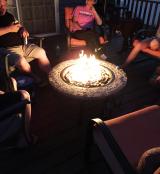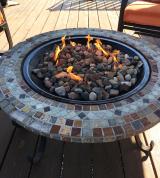Backyard Recreational Fires
Smoke from burning wood is made up of a complex mixture of gases and fine particles, which are also called particle pollution or particulate matter. Outdoor recreational fires can become a considerable source of fine-particle air pollution – especially in some metro areas. Children and teenagers, older adults, and people with heart or lung disease – including asthma and COPD – can be particularly sensitive to the health effects of particle pollution in wood smoke. Be a good neighbor when burning and consider your neighbors, as well as wind direction.
Enjoy Your Fire Pit Responsibly
If you choose to burn wood, reduce particle pollution with these steps:
- Only burn seasoned, dry wood, which burns hotter and cleaner.
- Use a moisture meter to check firewood; moisture content is best at about 20 percent.
- Cover stacked wood, but allow good air flow so it can dry.
- Never burn wood during air quality alert days, when air pollution is already higher.
- Never burn green wood, construction waste, plastic, garbage, or yard waste. They create more smoke and can be toxic.
- Take extra care if you live in a region where brush fires are of concern.
Cleaner Alternatives
Learn about your options before burning wood in your backyard. Switching to natural gas or propane reduces harmful air pollutants. Kits that convert existing fire rings and pits to natural gas or propane burners are available at hearth and patio stores.
Check Your Local Laws
Some local governments have adopted ordinances to restrict backyard recreational fires. For more information, check with local authorities.


